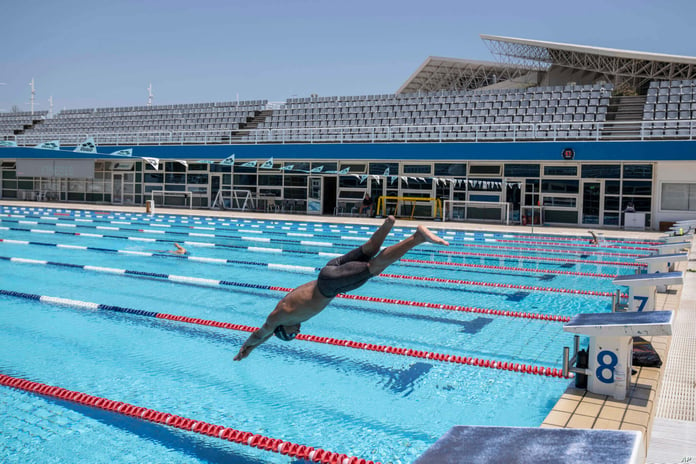
When Ibrahim al-Hussein fled Syria in 2012, after suffering an explosion during his country’s civil war, his life was turned upside down.
Nearly a decade later, Al Hussein is preparing for the second Paralympic Games in Tokyo and credits swimming for helping him rebuild his life and integrate after his migration to Greece.
In the outdoor swimming complex used for the 2004 Olympic and Paralympic Games in Athens, El-Hussein extends and removes his prosthetic leg in a shaded spot before entering the water for two hours of training under the scorching sun.
“I started swimming when I was 5 years old. My father was my coach in my country, Syria,” he said in a recent interview, reported by the Associated Press.
“I consider myself like a fish. It’s as if I wouldn’t be able to live if I was away from the water. On the day I don’t train for one reason or another, I often get upset and sad.”

When the battles intensified in and around the city of Deir Ezzor in 2012, one of Hussein’s friends visited him, and he says that when his friend left to go home, the latter was shot and ran to help him.
“I was about to take my friend to a safe place or a hospital. But unfortunately, as soon as I got there, after five seconds or less there was an explosion next to me.”
His friend survived, and Hussein received emergency medical treatment in a makeshift clinic before being transferred to neighboring Turkey. He lived on the sidelines there and had difficulty navigating, eventually making the dangerous boat trip to Greece, in February 2014.
Al-Hussein lost his leg due to injury.
“In the early days when I came to Greece, I found a doctor who helped me. After that, I decided to stay here. I found what I was looking for and had no reason to continue searching.”
Al-Hussein met a doctor who agreed to treat his injury and provide him with a prosthetic foot, and he began to feel at home in Greece. A year later, he finally entered the pool again, swimming with a club based at the Olympic Aquatic Center in Athens. By chance, he had seen the 2004 Olympic swimming competitions on TV when they were held at the same venue, and as a teenager, he had dreamed of competing there one day.
Al-Hussein’s return to the pool eventually led to him entering the competition again, first at the local level, and then beyond. His success as an athlete attracted attention in Greece, leading to an invitation to carry the Olympic torch as part of the 2016 Rio de Janeiro Games relay.

From there, he was contacted about swimming for the International Paralympic Committee’s new refugee team.
The conflict in Syria highlighted migration by 2016, and the organizers of the Olympics and Paralympics were keen to give refugee athletes a platform to compete. Until then, it was difficult to do so without the support of the authorities in their home countries.
The initiative has expanded. Al-Hussein was one of two Paralympian refugees in Rio, but there will be six of them this time. He is hoping to reach the finals even though the coronavirus pandemic has disrupted his training plans.
Al-Hussein is full of gratitude for his life and the opportunity to join the Paralympics with athletes from all over the world and says he wants to set a positive example for other refugees with disabilities.
“If you have the strength, don’t look to see if you’ve lost an arm or a leg,” he said, adding that “the strength comes from within.”
“You are looking forward to getting there. If you act, if you are sure, you will reach your goal. If you have a dream, if you do action, the moment will come. It will come.”













